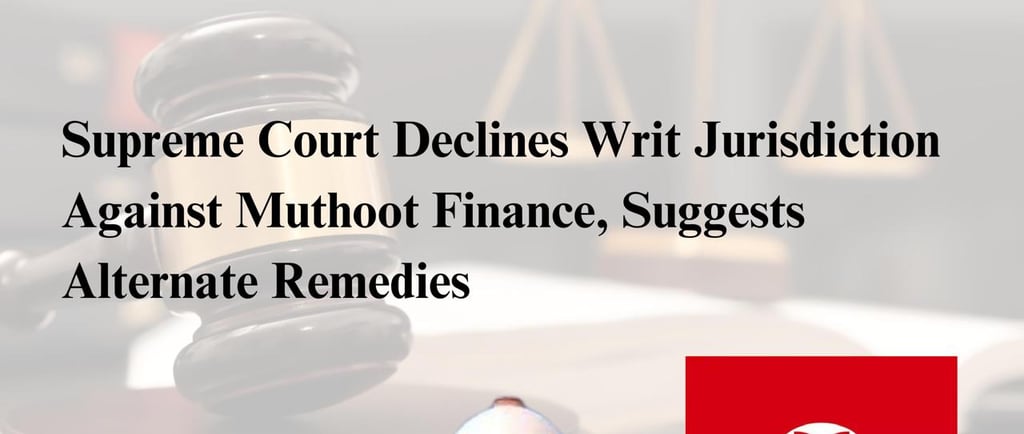Supreme Court Declines Writ Jurisdiction Against Muthoot Finance, Suggests Alternate Remedies
The Supreme Court of India has ruled that private entities like Muthoot Finance Ltd., a non-banking financial company (NBFC), do not qualify as "State" under Article 12 of the Constitution, making them not amenable to writ jurisdiction under Article 226. In its January 24, 2025, decision, the court dismissed petitions against Muthoot Finance, emphasizing that the company does not perform public or sovereign functions.
2/1/20251 min read


Non-State Status:
The court upheld the High Court's view that Muthoot Finance is a private entity not carrying out sovereign or public functions, thus not subject to writ petitions.
Alternate Legal Routes:
Petitioners were advised to explore civil remedies, including arbitration, as provided under the loan agreement with the company. The court noted the presence of a clear arbitration clause in the loan agreement.
Precedents Referenced:
Drawing from landmark cases such as LIC of India v. Escorts Ltd. and English decisions like R. v. Panel on Takeovers and Mergers, the judgment reiterated the distinction between public law and private law domains. The court stated that private entities may only be subjected to public law remedies if their functions exhibit a public duty or are of significant public importance.
Guidelines for Writ Jurisdiction:
The court clarified conditions under which writs may be issued, emphasizing that private bodies must discharge statutory public duties to be subjected to such jurisdiction. It also noted that mere regulation by a public authority like the RBI does not transform a private body into a public authority.
Protection of Deposited Funds:
To safeguard the interests of the petitioner, the court ordered the amount of ₹24,39,085—realized from the auction of pledged gold—be deposited with its registry in a fixed deposit. Interest accruing on this amount will be accessible to the petitioner, while the principal remains secured, pending dispute resolution within three years.
Court's Observations:
The judgment emphasized the importance of demarcating private law obligations from public law duties. It reiterated that courts must refrain from encroaching on private contracts unless a compelling public law element is involved.
Conclusion:
While dismissing the petitions, the Supreme Court underlined that NBFCs like Muthoot Finance remain bound by regulatory frameworks of the RBI but do not assume public law responsibilities. The petitioner was encouraged to pursue appropriate remedies, including civil suits or arbitration, for resolution of grievances
